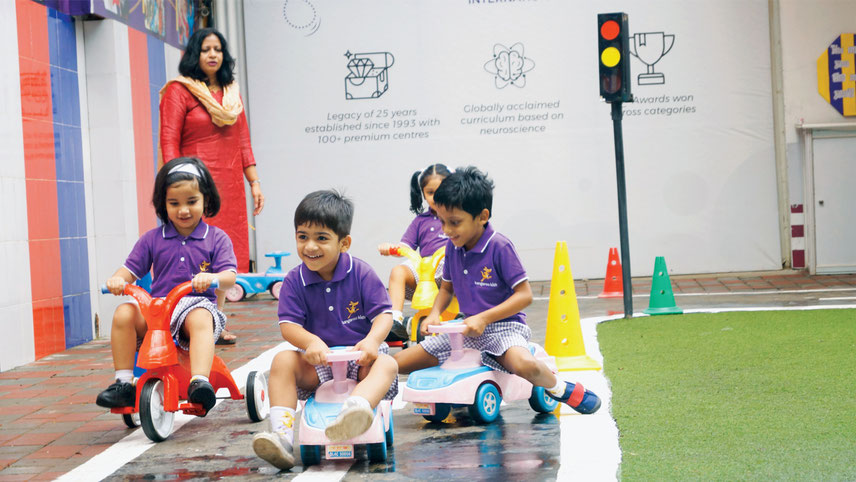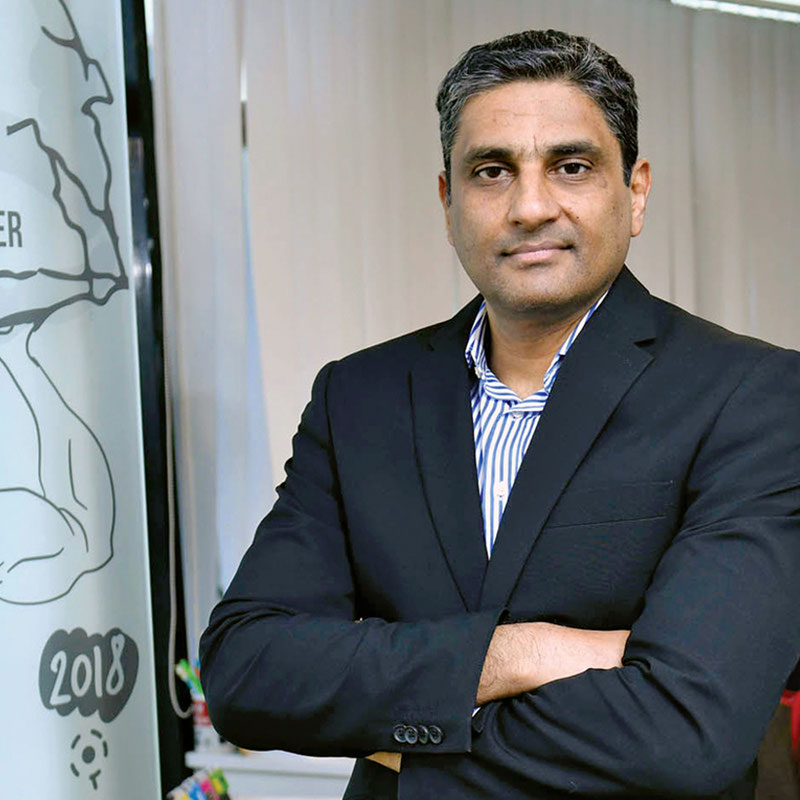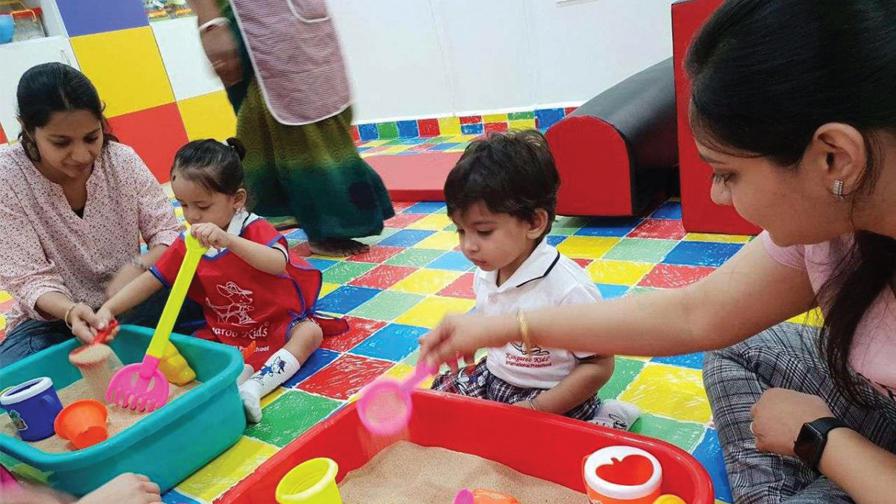-

Each session is carefully monitored to maintain safety standards
Seshasai believes that working in the education sector has given him the opportunity to play a transformative role in professionalising the education sector and bringing best practices from the corporate sector to the schools and preschools in the KKEL chain. He is driving KKEL’s vision and taking its innovative curriculum across India and international geographies. He is also working intensively to deliver KKEL’s vision of a technology-driven education, which can personalise and make learning more relevant to each child’s individual preferences and style.
“We will aggressively increase the number of centres and admission numbers in the next 3-4 years, by making this niche premium category more accessible and relevant,” adds Seshasai. “In fact, we want to become thought leaders in the preschool domain, with respect to parenting and education, and showcase sustainable and profitable franchise business models”. Seshasai’s vision is to notch up the number one slot in the premium category, where it competes with other premium brands like Maple Bear, Mother’s Pride, Poddar Jumbo Kids and Serra International – backed by EtonHouse Singapore.
In the entire organised preschool segment, where there are over 4,200 preschools, he is looking to double the share of KK to 2 per cent with this expansion. In the organised sector, which constitutes 25 per cent of the market, there are also other players like EuroKids, Kidzee, Bachpan, Shamrock, Global Champs, Hello Kids, Little Millennium and Tree House, vying for a share of the preschool market, which is valued at about Rs25,000 crore, and has been growing at a CAGR of more than 25 per cent. Eurokids, Kidzee and Bachpan together account for about 39 per cent of the organised pie, even as they are known for their mass positioning.
Experts believe that the share of organised players is growing consistently. With parental expectations over early childhood education and care on the rise, the share of the organised market is growing at a faster pace. About a decade back, the market was dominated by the grandmother-runcrèches or similar informal arrangements. Today, parents are looking for an extra edge, something which is scientifically designed, research-backed and outcome-oriented. This is where organised players will come into play. “The domestic organised preschool market is undergoing a big transition, as more and more Indian as also international players are entering the space with their offerings,” says Rushabh Shah, head, marketing & business development, KKEL. “The potential is huge against the backdrop of rising income levels, as also growing aspirations. And, these present big opportunities for players like us. At KKEL, we foster an environment for learning and, more importantly, have a structured and a free-flowing curriculum, which enables children to develop their individuality and excel in life”.
Action-based learning
“In fact, we are looking to revolutionise this industry by leveraging our premium brands,” adds Shah. “We intend to develop a unique curriculum, based on neuroscience, and extend our leadership in this segment (franchise & admissions)”.
-

Seshasai: `our chain has strong brand equity’
Over the years, the company has put in place a strong capability, while also building a well-established brand for itself in the market. Even as it expands its network, the company will pursue the dual approach of franchise (primarily) as also the company-owned, company-operated (COCO) model. In the case of expanding the BHIS school network, the company wants to be also aggressive on coco model. With a yawning gap felt by trainee teachers and educators between the content offered in teacher training courses and the demands of a real-life classroom, KKEL embarked on a unique journey in 2004 – to impart teacher training that would be on an even keel with the standards followed at international levels, keeping in mind its path-breaking, learner-centric approach. Kangaroo Kids Institute for Teacher Development and Research (KITDR) was instituted to provide quality programmes, which harness the potential of learners and prepare them to face the challenges of a dynamic educational environment.
The entry qualification for KITDR is a Masters in Human Development/Child Development with a minimum of five years of experience in preschool set-ups. KKEL has seven centres across four cities in India, with one trainer for every 15 students in a KITDR centre.
“Today, getting right pool of skilled teachers is a big challenge and, through our KITDR initiative, we are trying to address this issue,” affirms Shah. “KITDR helps develop confident teachers who will prepare children to handle dynamic situations in different contexts. Our objective is to develop not just teachers, but leaders in education”.
KK and Billabong schools have pioneered a unique proprietary pedagogical model, which has been developed over 26 years with more than 150,000 man-hours spent on research and design, based on contemporary education research, neuroscience and energy science. Under its Kangaroo Kids Club, KKEL runs a toddler programme too. The club facilitates action-based learning in a fun-filled environment. The sessions are specially designed to encourage the exploratory side in toddlers and provide multi-sensory stimulation through visual, auditory and kinaesthetic (touch-based) programmes. Each session is carefully monitored to maintain safety standards and to allow individual toddlers to achieve their maximum potential. KKEL is among the first in India to offer a mother-toddler interactive programme.
Foreign investments experts are of the view that the recent acquisition of Eurokids by KKR will lend more wherewithal and resources to KKEL and hence offer a distinct edge to it over its competitors which also include foreign players. They are of the view that having KKEL’s brands in anyone’s portfolio makes it more attractive proposition for a global investor like KKR, which is also betting on the Indian education sector. “The desire for high-quality educational services is at an all-time high in India,” says Ajay Candade, director, KKR. “The country has over 125 million children in the two-to six age range, as well as the largest K-12 population in the world at 320 million people”.
-
KKR plans to grow the portfolio of brands under EuroKids through organic as also inorganic routes and enhance its offerings and practices
KKR plans to grow the portfolio of brands under EuroKids through organic as also inorganic routes and enhance its offerings and practices. It will further focus on including digital learning and tech-enabled teaching practices to expand the firm’s approach to a more holistic education model. The school franchise, an official statement says, would continue adding high-quality education brands to its portfolio.
KKR acquired 92 per cent stake in EuroKids for a consideration of Rs1,500- 2,000 crore in what is viewed as one of the largest foreign investments in India’s educational sector. The acquisition includes 80 per cent stake of domestic fund Gaja Capital and Swiss fund Partners Group in EuroKids. In 2013, the Gaja Capital-led consortium of investors had acquired a controlling stake in EuroKids from education solutions provider Educomp Solutions.
This is not the first time KKR has bet on the education sector. In 2018, it signed a binding agreement for the sale of Cognita Schools, a UK-based global private schools group in which KKR had acquired a majority stake in 2013. The school-chain, established in 2004, runs more than 70 schools across eight countries, educating more than 40,000 children. With all these developments in place, KKEL is well geared up to increase its footprints in the fast growing premium preschool segment.
The chain already has a proven track record and brand, and this is what it now wants to leverage. Its hydrid model of franchise and co-owned is an apt approach since it facilitates faster expansion without much bearing on resources and at the same it infuses confidence in the market. Being part of a large chain like Eurokids, which is now backed by a global investor like KKR, will infuse further confidence in the market as also offer a distinct edge to face the competition. All in all, the premium preschool chain is all set to scrip a major success story, going forward, even though it will have to face some competition from other players who are also gearing up. ♦




































